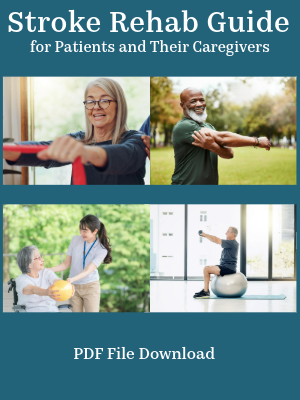Submissions from Readers
recognition/memory loss
Question: My mum had a stroke in the last 2 days but does not recognize my dad. Is this common?
Answer: It is not uncommon for someone to be confused and have memory loss after a stroke especially in your mom's case where it has only been a couple of days since the stroke. Stroke patients are often much more confused in the days after a stroke, and this usually improves.
Comments for recognition/memory loss
|
||
|
||
|
||
|
||
|
||
|
||
Memory Relapse After Mild Stroke (5 Months)
by Dale Blackwell
(Reidsville,NC)
Question My mother had a "mild" stroke in April 2012. She can walk and talk pretty well but a few months later, sometime in September 2012, she got up one morning and it was difficult for her to think clearly. It's now October and her cognitive abilities are still worse than they were in September. What happened? We've seen the Neurologist and he says it wasn't a TIA. Also, for the past couple of weeks she has had a sore leg right at the top of her calf/ bottom of knee on the backside. The doctor said it wasn't her medication and she had an MRI to rule out a clot. Any ideas on that? Any help would be GREATLY appreciated.
Answer: TIA was my first thought. Cognitive changes could also be due to vascular dementia which can be a direct effect of stroke or can be due to vascular problems that occur over a period of time depriving the brain of essential oxygen and nutrients. I am not a doctor so I'm really speculating as to what it may be. I would have her go back to the neurologist and get definitive answers if I were you (maybe try a second neurologist since the first didn't have answers for you).
As far as the posterior knee/calf pain, I have two thoughts. One might be that she has spasticity or tightness in her calf from the stroke. Another thought is that she may be hyperextending the knee causing inflammation/pain to the posterior tendons/ligaments. If the pain is not on the side of the affected leg, then maybe it's due to the stronger leg overcompensating for the weaker leg (assuming that she has one side weaker). Since you have ruled out a blood clot, then it wouldn't hurt to go see an orthopedic doctor to help you determine the cause. Sometimes patient just have pain from their stroke, but since it's such a specific area, I think something must be inflamed or tight.
Comments for Memory Relapse After Mild Stroke (5 Months)
|
||
|
||
short term memory problems
by lisa mehlberg
(st. louis Mo, USA)
Question My husband is 44 yrs old and suffered a large stroke on the right side of his brain. He is physically okay and long term memory is pretty good. His main problem is short term memory. He forgets in about 10 minutes and has problem solving issues.
He works in the IT computer field and has a very complex job. We have 3 children ages 8, 6, and 5 yrs old. We play their board games and get on websites a lot. I notice that he doesn't see the left side of papers unless I direct him there.I am wondering if there is anything more I can do with him at home to help. He goes to a day facility rehab 3 days a week as well.
Thank you!
Answer First, since you are saying that he is not seeing the left side of papers, I would get him an appointment with a neuro-optometrist. They can see what is going on with his vision and get him special eyewear. Make sure it is a neuro-optometrist and not just an optometrist so that he gets the best evaluation and treatment. Secondly, if he is not receiving speech therapy (ST), ask the MD for an order (I assume he probably is already receiving ST since he is going to a day facility but just want to make sure). Talk to the ST about making a memory journal that he can keep with him. This way he can refer to it if he forgets. Also, using timers/cell phone reminders/day planners can be helpful in activities such as cooking, getting to appointments, taking meds etc. Having a daily schedule can also make things easier. Activities to improve short term memory include:
Trying to learn a new musical instrument or hobby.
Make sure you get enough sleep and exercise.
Stay involved in social activities/opportunities to communicate with others.
Using memory strategies such as imagery, chunking, mnemonics, association, etc.
Working crossword puzzles
Using opportunities in everyday life to work on memory recall. One can also work on memory recall activities directly related to their job/work. Functional use of memory and problem solving in everyday life is most beneficial.
Comments for short term memory problems
|
||
|
||
|
||
|
||
|
||
|
||
Recognizing loved ones after a massive brain bleed
Question: A friend of mine suffered a massive hemorrhagic stroke 3 weeks ago. They performed surgery, and she was in a medically induced coma for 10 days. Despite all odds she woke up and has been making progress. She's breathing on her own with little help from oxygen through trach. She totally seemed to recognize her friends and family. Mouthing "I love you" and laughing and smile at appropriate times. She was moved to a rehab two days ago. She seems to be a lot more confused now than she was in the hospital. They capped her trach, and she is now able to talk but she's saying she doesn't know who her loved ones are. Why did she recognize us a week ago but not now? Will her memory come back?
Answer It's not unusual for stroke patients to be very confused in the initial stages after having a stroke. Based on my experience in working with stroke patients, I imagine your friend's memory of loved one's and friends will return especially since she recognized you in the hospital. I would bring it to the attention of the inpatient rehabilitation staff if her cognition has decreased since leaving the hospital as they will want to be on the lookout for brain bleeding/increased pressure in the brain. Medications can also make patients more confused as well as the time of day. Fatigue often sets in at the end of the day and can effect cognition.
Comments for Recognizing loved ones after a massive brain bleed
|
||
|
||
Short term memory loss
Question: My husband had a stroke 4 years ago and has severe short term memory loss which I am told will never get better. It is stressful for him and for me. I recently retired and am now home with him all day. I need some help to cope with the frustration. Are there books to help caregivers of short term memory loss patients or support groups to help? Thanks you. Peggy Brouillet
Answer: Peggy, I would go to a caregiver website or stroke support group website and search for any postings regarding short term memory loss. I have listed some caregiver websites at https://www.stroke-rehab.com/caregiver-assistance.html and some stroke support group websites at https://www.stroke-rehab.com/caregiver-assistance.html. Almost all the websites that I have visited have forums that have a search function that should allow you to look for information relevant to short term memory loss or any other topic you want to search. You might find information from those who have spouses with dementia and Alzheimer's as well since these are diagnoses that will have problems with short term memory.
Confusion
by Jane
(Kentucky)
Question: When a stroke victim gets confused about who someone is or who has been to visit, is it better to correct them or just go along with what they say.
Answer: Honestly, it depends on the situation. If the stroke is newer and you are trying to orient the person to what is going on and help improve their memory then I would say to go ahead and give them the correct information. If, however, it is a chronic stroke and memory has shown to be permanently damaged or they have dementia, then I would not say anything. You might be able to help them by giving them a memory notebook or log where they can fill in the information (or someone can help fill it in) then refer them to it when they are trying to accurately remember an event.
Memory issues
by Ibrahim
(Karachi, Sindh, Pakistan)
Question: My mother is recovering from stroke. She can walk now but has trouble keeping her balance and has a lot of memory related issues. From what I have observed, she doesn't remember the events which occurred in the past 6-10 years and has short term memory loss, what can be helpful in her recovery?
Answer: I think a very helpful adaptive strategy would be to make her. Either you or she could record information to help her keep up with not only information from her past but also recent information. It would be best for her to do it if she is able because writing the information may help her remember better, but if she is not able, it is perfectly fine for you to write the information for her (assuming she can still read). This is only an adaptive technique and won't improve her ability to remember but does allow her to function better in her daily life as she has a backup technique.
As far as exercises to improve memory, you can try repetitive drills, mnemonic strategies, rhymes, songs, stories, codes, imagery, computer games, crossword puzzles, and board games. It would be beneficial to practice repetitive drills with information you feel is important for her to remember.
Comments for Memory issues
|
||
|
||
Memory and Emotional Problems
by Diane
(Kingston USA)
Question: My husband had his 7th stroke recently, and he has emotional and memory problems. He is on Ativan .05mg 2 x a day. He seems to have confusion when I give him both doses, but when he doesn't get it, he is irrational trying to fight with me and who ever else is around. His latest stroke was in the occipital area so his eyesight is compromised although he tells everyone a different story. My question is how to talk to him when he thinks he can drive and says he didn't have a stroke and there is nothing wrong with him. He uses both hands and legs without any problems. He also said that we put him in the hospital and they did nothing for him not even a pill.
Answer: Unfortunately, sometimes after a stroke or several strokes, individuals may have poor insight into their disabilities which appears to be the case with your husband. As long as he continues like this, it will be imperative for family to help keep him safe. Eyesight problems can put one at a risk for falls, and obviously cause big problems with driving as can cognitive deficits. You may not be able to convince him of his deficits, but in my opinion, it is important that family continue to stress safety issues and deficits to him but still be supportive and loving, not condescending. I would encourage you to have him visit with a neuro-psychiatrist or neuro-psychologist that specialize in working with patients that have emotional/mental issues stemming from neurological injury. You could also talk to the neuro-psych doctor about ways to talk with your husband. I think it is also important to have medical personnel stress to your husband any precautions they recommend such as not driving. Unfortunately, your situation can be very tough. I have seen several patients that were physically able to move well but who had eyesight and cognitive deficits that were very incapacitating. This can be difficult for families especially when patients don't look like there is anything wrong. Just remember that the most important thing is your husband's safety. You might also get ideas on ways to deal with your husband's behavior through support groups for caregivers. They have support groups and forums online as well as ones that can be attended in person.
Comments for Memory and Emotional Problems
|
||
|
||
|
||
Setting priorities.
by Rich S.
(Lebanon, Pa.)
Question: During Rehab, after my stroke (2012) I was given worksheets on how to plan my days, or projects I was working on,learning how to function in the most efficient order to accomplish any given workload. I have left-sided weakness, can walk (with cane), can read and enunciate, hold conversations (tend to get distracted). I do have problems planning what I want to get accomplished during any given day and have a tendency to forget things I planned on completing. Do you have any idea where I can find some daily planning worksheets?
Thank you for your help. Rich
Answer: There are many websites online that have worksheets. It's a matter of finding one that fits your needs. Here are a few that I found:
http://www.tbistafftraining.info/Resources/Resources_3_Worksheets.htm
https://scatteredsquirrel.com/printables-index/
https://www.home-storage-solutions-101.com/how-to-get-organized.html
www.google.com/search
academic success strategies and memory loss
by Laura
(Ephrata, Washington)
Answer: Nine years ago I had a stroke due to lack of oxygen. Prior to that being very successful in school came easier usually with A's and B's. Now I find my memory not quite as effective or reliable. I want to go back to school now and I am hesitant because of my distrust of my memory. what can I do? To whom can I go?
Answer: I would not let your injury stop you from returning to school. Schools can make accommodations to help you such as allowing videotaping or recording of lectures, extra time for assignments, note taking accommodations, and various services. Consider what schools you want to attend and contact them regarding services/groups/accommodations for those with brain injury. There are many online resources to help those who want to return to school after a brain injury such as stroke. Here are a few links for you:
https://www.accreditedschoolsonline.org/resources/students-traumatic-brain-injury/
https://www.washington.edu/doit/what-are-some-ways-provide-note-taking-accommodations-student-disability
https://safestars.org/disabled-college-student-guide
https://www.brainline.org/article/student-brain-injury-achieving-goals-higher-education
Treatment Tips from Others
To see tips from other survivors and caregivers about their treatment recommendations, click here.
Get Our Stroke Rehab Guide

Our stroke rehab guide is designed specifically for patients and caregivers. It's in pdf format and can be immediately downloaded. It includes about
- Stroke Definition & Causes
- Stroke Treatment
- Rehabilitation Information for Physical, Occupational and Speech Therapy
- Exercise pictures
- Q&A from patients and caregivers
- Adaptive Equipment & Techniques
- How to Prevent Another Stroke & More!
Medical Disclaimer: All information on this website is for informational purposes only. This website does not provide medical advice or treatment. Always seek the advice of your physician or other healthcare provider before undertaking a new healthcare or exercise regimen. Never disregard professional medical advice or delay seeking medical treatment because of something you have read on this website. See the disclaimer page for full information.
- Home
- Stroke Questions
- academic success strategies and memory loss













